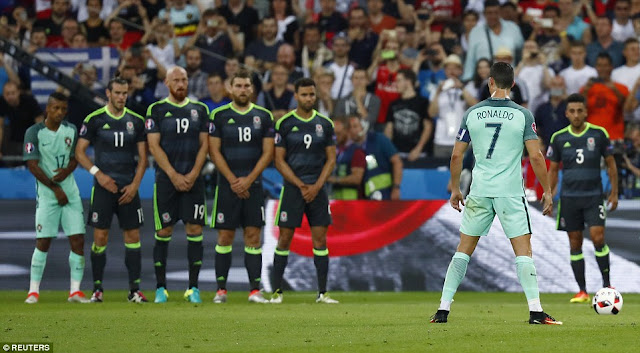Impossible to
begrudge, too. For all that cynics carp about his carefully crafted image, his
apparent selfishness, the way every event turns into a festival of him, him,
him, there is also something to be enjoyed in a great player who takes such
pleasure in the simple act of scoring a goal.
There are so
many scowls now, so much posturing, cynical badge kissing, inexplicable anger
and moodiness, that to watch Ronaldo and the happiness the moment brings,
remains among football’s rays of sunshine.
He knew what
the goal meant, not just personally, but to his country. Within three minutes,
Portugal had scored again — Ronaldo’s shot setting it up this time, Nani on
target — and the match was won.
Dragons are
mythical creatures, and Wales’s run to the semi-final here has sometimes seemed
unreal, but this was one mighty effort too many. With key players suspended, it
was always going to be difficult to overcome even an ordinary Portuguese side,
and so it proved.
Wales sorely
missed Aaron Ramsey’s influence in midfield and barely threatened as a
result.
Their
progress has been magnificent, but within this egalitarian group there is a
core of players that manager Chris Coleman could never do without in a match of
this nature, Ramsey among them.
They were
never as dangerous as against Belgium and goalkeeper Rui Patricio was scarcely
troubled.
The last time
a major international tournament used a format of 24 teams reduced to 16 for
the group stage, a lucky loser — third-placed Italy — ended up in the final,
and so it is here.
Italy scraped
out of their group at the 1994 World Cup and Portugal finished third behind
Hungary and Iceland.
Fernando
Santos’s team had not won a single game inside 90 minutes until this game, but
here they are. So Ronaldo must have something.
This is not a
great Portugal team, but it is propelled by the desire of a great player. He
was voted man of the match, and rightly so.
It
wasn’t just his part in the goals that made him stand out — or even the
free-kick that came as close as he has ever been to scoring with a dead ball in
an international tournament — but more the way he served his team.
He put in a
shift, he truly did. Up and down the flank when necessary, central for much of
the game, always alert to opportunity, always the man most likely to decide the
occasion.
This was
equally billed as Ronaldo versus Gareth Bale, the battle of the Galacticos.
There was only one winner there, too. Bale was reduced by Ramsey’s absence. He
had lost his fellow creative, the man who helps make his space.
So this was
Ronaldo’s night and what a header it was to open the scoring. Ronaldo outjumped
James Chester but no fault can be attached to the centre half. He was simply
beaten by the better man, a short corner whipped in, the angle changed to best
suit its target, Ronaldo, eyes on the ball, leap, hang — and in like a rocket.
Just three
minutes later, that lead had doubled and one sensed there would be no way back
for Wales.
It was
Ronaldo’s shot this time, evaded by Renato Sanches, who may have been marginally
offside and was most certainly active, finding Nani who poked it past Wayne
Hennessey from close range.
Hennessey
spilled another shot from Nani soon after, which Joao Mario should have scored
on the rebound, but it would have been harsh for Wales to go down too
heavily.
This has been
far from a vintage tournament, but not for Wales, who have excelled. They can
leave with heads high, beaten by a player who, even at 32, can still lay claim
to being the best in the world. It was a huge night for British sport and the
good news for those who hung on through the fourth and fifth sets of the Andy
Murray tennis match before turning over to the football was that they didn’t
miss all that much in the first half.
It wasn’t
bad, but it was hardly Wales’s quarter-final with Belgium, which crackled with
tension from the start.
For all the
hyperbole around the match-up of Ronaldo and Bale, the pair sought influence
without real success in the first 45 minutes.
The best Bale
could do was force a corner or two with his crosses, the best for Ronaldo was a
44th-minute header that at no time looked to be going in.
He was
surprisingly well marshalled by James Collins, replacing the suspended Ben
Davies at the back, even if some of the West Ham man’s moves were dangerously
close to attracting the attention of Swedish referee Jonas Eriksson.
Certainly
Ronaldo was screaming for a penalty when Collins placed him in what appeared to
be a headlock in the area early on. It could easily have been given but
Eriksson and his assistants were not that brave.
Joe Allen did
go into the book, though, for two fouls inside eight minutes, and was lucky not
to see red for another clattering challenge.
The amnesty
that UEFA grants at the semi-final stage — only a player sent off can be banned
from the final — makes foul play almost the sensible tactic if threatened, and
the players take full advantage. It makes for disjointed matches, at times,
like this one.
Ronaldo, too,
was booked late on for dissent, but even with the minutes ticking down, he
remained on the pitch. Portugal rested him against Albania in a qualifying game
once, lost, and the manager got sacked. No chances were being taken, and none
were sought.
Ronaldo would
have had to be dragged off by his expensively coiffured hair and, at the final
whistle, his smile said it all. Joy, unbridled. Was this his proudest moment
for Portugal? There is no doubt.












Post a Comment